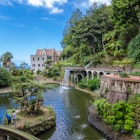
Dec 23, 2024 • 8 min read

May 12, 2020 • 3 min read

Lisbon is situated on the northern banks of the Tagus River, the longest river on the Iberian Peninsula.
Portugal's tourist board has created a "Clean & Safe" stamp for hotels, restaurants and tourism-related businesses to show they are compliant with increased safety and hygiene measures aimed at stopping the spread of COVID-19 and "other infections."
Turismo de Portugal launched the scheme at the end of April in a bid to restore the public's confidence in the tourism sector for future travel, as Portugal slowly began to ease its lockdown restrictions. In accordance with the Clean & Safe scheme, the national health authority created online training programmes and requirements for businesses, including enhanced cleaning protocols, temperature screenings and making personal protective equipment available for everyone who passes through their doors. The provisions differ across businesses but they're all aimed at keeping staff and customers safe.
This new seal of approval is free, optional and is valid for one year. Once the stamp of approval is given to a business, they can publicise it as a digital badge on their online platforms or as a physical sticker on their premises. Compliant businesses will be subject to random audits in the months following their approval to ensure the new standards are maintained.
A spokesperson for the tourism board confirmed to Lonely Planet that as of 11 May, 3430 businesses have signed up, including tourism establishments, tourism entertainment agents and travel tourism agents.
Read more: Will ‘bubbles’ be the future of post-virus travel?

"With this measure, the national tourist authority intends to inform companies on the minimum hygiene requirements and cleaning measures to ensure the safety of various establishments," Turismo de Portugal said. Additionally the scheme will "promote Portugal as a safe destination with measures in place to prevent the spread of the virus via a coordinated action plan from the sector, which will soon expand to other areas of activity."
The airport authority is also working alongside the tourism board to "guarantee a safe journey chain" for passengers by adapting reinforced protection and hygiene measures, validated by the National Health Department. These include temperature scanning at Lisbon, Faro, Madeira and Ponta Delgada airports; contactless check-in; sanitising equipment with sensors to avoid hand-touching; facial masks and protective equipment recommendations for staff and passengers, and improved air renewal systems in terminals, among others.

Portugal's state of emergency was lifted on 2 May after six weeks of lockdown. Some shops and businesses have already opened as the country gradually eases restrictions in phases. Cafes, restaurants and bars are expected to open on 18 May under new social distancing rules and some hotels in regions like the Algarve are eyeing openings in June and July. However, international flights carrying holidaymakers are on hold for now but the industry is hopeful that domestic tourism can make up for the drop in overseas tourists.


Dec 23, 2024 • 8 min read





Dec 13, 2024 • 9 min read


Dec 11, 2024 • 8 min read
